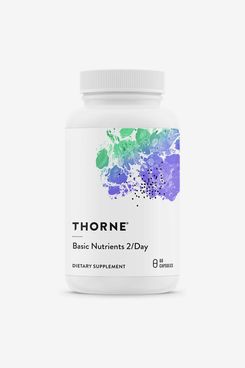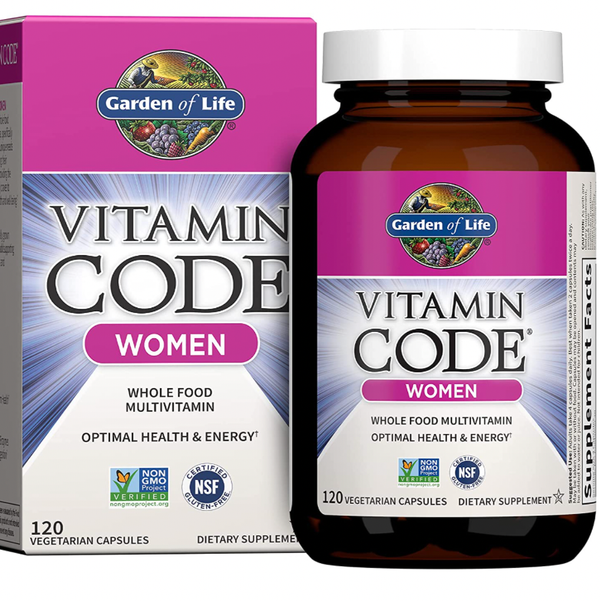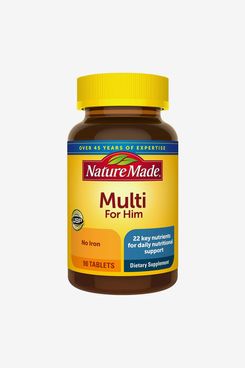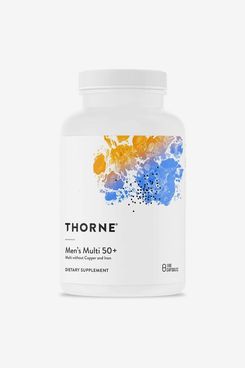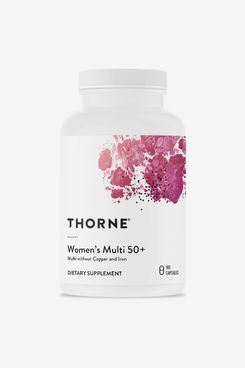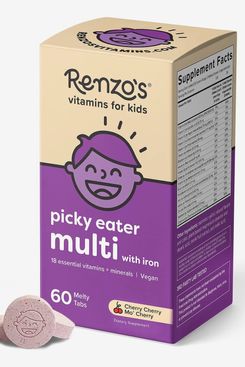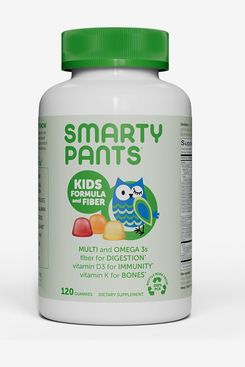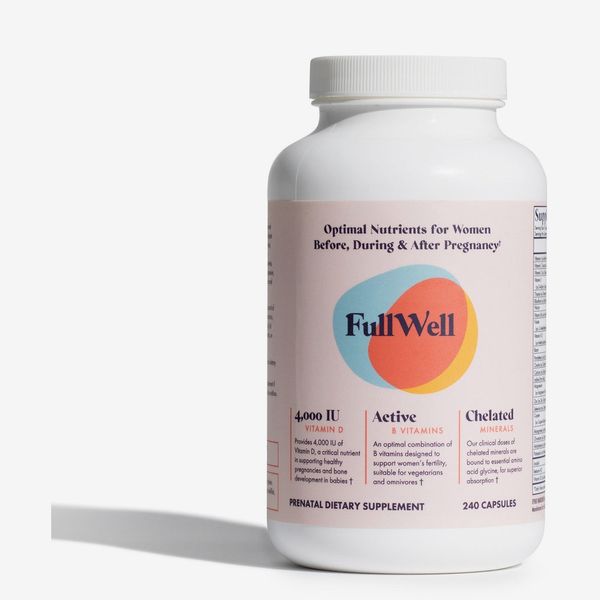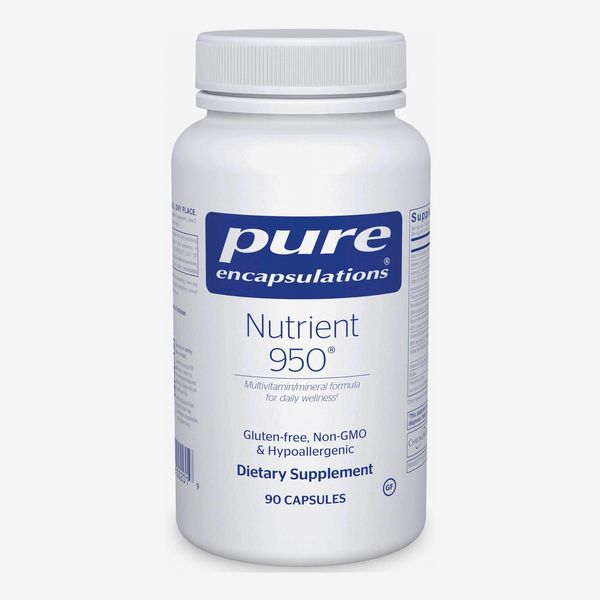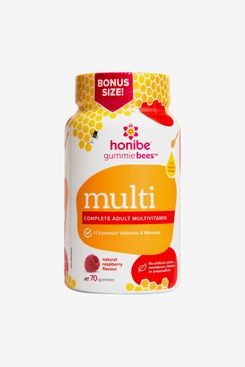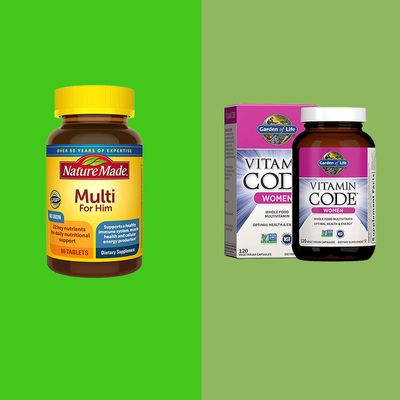
In this article
In a perfect world, we’d eat “five to seven cups of vegetables a day,” according to naturopathic doctor Kate Denniston. But in reality, “most of us get just a fraction of that,” she says. That’s where multivitamins come in — to fill in nutrient gaps. As registered dietitian and founder of Chelsea Nutrition Jennifer Maeng says, you can think of multivitamins as an “insurance policy” that can supplement dietary blind spots. Amy Shapiro, a registered dietitian and founder of Real Nutrition, seconds that, calling multivitamins a smart “safety net” to round out our diets.
There is one caveat to consider: The efficacy of multivitamins is not exactly agreed upon in the medical community. “Most trials and studies show no (or a modest) effect of multivitamins in the general population,” says Jagdish Khubchandani, a professor of health science at New Mexico State University. And naturopath Ashley Margeson stresses that “multivitamins should always be approached as an addition to your regular nutrition, not the whole thing.”
To get the most out of the multivitamins you take, choose the very best ones that can also fit in your budget. That might seem easier said than done: Anyone who’s taken a spin down the supplements aisle at Walgreens knows that there are a lot of options out there. So to help you get started, I asked Denniston, Maeng, and nine other doctors, dietitians, and nutritionists about the ones they recommend to their patients generally and for different age groups and specific needs. If you already know what you’re looking for, use the table of contents to skip ahead. Otherwise, keep reading for every one of our expert recommendations (and don’t forget: It’s always a good idea to talk to your doctor before adding a new supplement to your routine).
Update on December 16, 2024: Updated prices and checked stock for all products.
What we’re looking for
Third-party certifications
The market for vitamins can be complicated. Vitamins aren’t regulated by the FDA, so they don’t have the same strict regulations as, say, prescription drugs. Shapiro suggests choosing options that have been third-party tested “to make sure they contain what they say they contain.” Leann Poston, a physician and medical-content expert for Invigor Medical, suggests checking products for the seal from the United States Pharmacopeia (USP). Another thing to check for is the National Science Foundation’s Good Manufacturing Practices (NSF-GMP) certification, which naturopathic doctor Maura Henninger recommended when we went in search of the best drugstore vitamins. Labels like USP and NSF mean that a company has voluntarily gone “through rigorous audit processes to evaluate the quality of products,” Maeng points out.
Easily absorbable ingredients
When it comes to choosing a multivitamin, you’ll want one that includes vitamins in their bioactive forms, which means they’ll be completely absorbed and used up by your body. Typically, multivitamins will contain vitamins A through E, along with other metals and minerals like calcium, copper, and iron, explains Nicole Sohayegh, a registered dietitian with New York City Nutrition. Margeson says you’ll see vitamin A listed as beta-carotene; iron as a citrate or other ferrous fumarate, sulfate, or gluconate; and folate as L-5-methyltetrahydrofolate or 5 MTHF. “If these three ingredients are in the bioactive forms, then you can be sure most of the other ingredients are also bioactive,” she says.
Designed for specific needs
Different people need different amounts of nutrients, according to Maeng — and what you’ll need will depend on factors like life stage, dietary choices and restrictions, and any digestive conditions you might have. “In general, I look for the things that I think are primarily missing from someone’s diet,” says Aubrey Phelps, a registered dietitian and certified lactation counselor. “That’s what I’m going to make sure that we prioritize in the multivitamin.” For example, Maeng points out that folate (or vitamin B12) and iron are important for expecting mothers because they aid with red-blood-cell formation. And according to registered dietitian and nutritionist Nicole German Morgan, multivitamins may be even more essential for older adults, because “as we age, the body can’t absorb quite as many nutrients as when we were young.” Margeson adds that postmenopausal women in particular will “want that calcium and that magnesium, that vitamin K and that vitamin D, to help support good bone health.”
Type of vitamin
Between tablets, capsules, and gummies, it can be difficult to know what type of vitamin is best for you. Ultimately, “consistency is key,” advises Henninger, adding that whichever form you feel you can most easily stick with is a good choice. That said, if you’re comfortable taking pills, you’ll do best with capsules “for the simple reason that ingredients such as sugar aren’t needed to make the product taste good, as it will be swallowed rather than chewed,” says pediatric dietitian Malina Malkani. “Capsules do tend to be the best formula because they’re often very hypoallergenic and people report less nausea and upset stomachs when taking them,” adds Morgan.
If you can’t take pills or are looking for something with a longer shelf life, you can turn to tablets or gummies. Tablets are made up of powdered ingredients that are formed into a hard pill. They have a longer shelf life than capsules and can be broken in half. They can also fit more vitamins and minerals in a single pill than can usually fit into one capsule. Despite these benefits, “Tablets are most known for causing people to feel nauseous and are often more cheaply made with just more fillers or forms of the vitamins and minerals that are not as absorbable,” says Morgan. Gummies, though tasty, face similar shortcomings. “In the past, when it comes to testing what’s in those gummies, the testing has come back to be inaccurate from what’s on the label,” she adds. In recent years, though, the market for gummy multivitamins has “truly exploded,” according to Margeson, bringing with it improved gummy-vitamin options. And one thing to note: If you are a vegan, you’ll want to check that your capsule vitamins and gummy vitamins don’t contain gelatin.
Dose per day
Taking three pills every morning might not bother you if your multivitamin is all you take on a daily basis. But if you’re regularly taking other medications, it can all start to add up to a queasy stomach. So for those people who really care about the number of tablets, capsules, or gummies needed to get the full dose of any given multivitamin, we’ve noted the daily dose for each product below.
Price per dose
Depending on the recommended dosage, one bottle could last you anywhere from a few weeks to a few months. I’ve calculated the approximate price per dose based on each product’s suggested dose per day.
Best multivitamin overall
Third-party certifications: USP and NSF certification | Designed for: Most adults | Type of vitamin: Capsule | Dose per day: 2 capsules | Price: $1.06 per dose
If you’re looking to add a multivitamin to your routine and don’t want to give it too much thought, go with this one. Four of the health professionals I spoke to recommended it for its quality and simplicity. Plus, you won’t have to take too many pills: “It’s a two-a-day as opposed to most multis, which are going to be in the three-or-four-a-day range,” says Margeson. “The reason for that is that they very much view it as an additive to a healthy diet. It just gives you a little bit extra.” Within the capsule, you’ll find B12 and folate in their high-absorbing forms in addition to B vitamins, C vitamins, magnesium, zinc, calcium, and more. You’ll know that these nutrients are actually in the multivitamin because the vitamin has earned the USP and NSF certifications.
Best women’s multivitamin overall
Third-party certifications: NSF and kosher | Designed for: Women | Type of vitamin: Capsule | Dose per day: 4 capsules | Price: $1.32 per dose
While the Thorne multivitamin is a solid multivitamin for anyone, women in particular can benefit from a multivitamin that’s suited to their life stage, whether that’s postmenopausal, perimenopausal, looking to get pregnant, or simply menstruating, according to Margeson. Maeng recommends this option from Garden of Life as a general women’s multivitamin for any life stage because it contains an adequate amount of both B12 and iron. “Iron is one of those minerals that I almost want 100 percent of my women taking because women will lose iron when they menstruate. Even post-menopausally, we find that that women run low-iron just because most of us don’t really eat lots of high-iron foods,” Henninger says. You’ll just want to be careful of vitamins with iron as they can cause constipation, according to Maeng, but these also include probiotics for optimal gut health to counteract those side effects. They’re gluten free, kosher, free of binders and fillers, and NSF-certified. Don’t worry that it isn’t vetted by the USP — “Since it is food-derived from whole food, it does not need USP verification,” Maeng says.
Best men’s multivitamin overall
Third-party certifications: USP | Designed for: Men | Type of vitamin: Tablet | Dose per day: 1 tablet | Price: $0.15 per dose
Maeng approves of this Nature Made multivitamin for men, which is USP-certified and doesn’t contain high doses of nutrients men typically need less of, like iron. In particular, “We want a good blend of the B vitamins for energy support and metabolism. We also want a little bit of zinc as well,” Morgan says. You’ll see these nutrients in the Nature Made tablet along with folate, vitamin C, calcium, and more. It’s also gluten free and free of artificial colors or flavors. As a bonus, you only need to take one tablet a day.
Best multivitamin for senior men
Third-party certifications: No USP or NSF certification | Designed for: Men age 50+ | Type of vitamin: Capsule | Dose per day: 3 capsules | Price: $0.83 per dose
Similar to postmenopausal women, senior men need to look for a multivitamin that caters to their specific needs in a later stage of life. Notably, you’ll want to look for calcium and vitamin D, which gastroenterologist Niket Sonpal says is a powerful combo for keeping aging bones strong. Henninger recommends this multivitamin from Thorne because it coincides with the specific nutrients men need in that time of their lives. “They’ll tailor their level of B vitamins, their level of vitamin D, their zinc level to be just a little bit higher and more specific to men as we find their needs in that timeframe,” she says. Like the two-a-day Thorne supplement above, this option also has USP and NSF certifications. Plus, it’s gluten free and doesn’t include any artificial flavors.
Best multivitamin for senior women
Third-party certifications: USP and NSF certification | Designed for: Women age 50+ | Type of vitamin: Capsule | Dose per day: 3 capsules | Price: $0.83 per dose
Senior women will benefit from a multivitamin that supports good bone health. In addition to that, Morgan says that “if a woman is perimenopausal or menopausal, we’ll look for higher amounts of minerals in the multivitamin which can support all the hormones in the body.” A multivitamin that’s high in calcium, magnesium, zinc, vitamin K, and vitamin D like this third-party-tested one from Thorne is ideal. It’s also free of gluten, dairy, and artificial flavors.
Best multivitamin for kids
Third-party certifications: NSF | Designed for: Kids ages 2+ | Type of vitamin: Dissolvable tablet | Dose per day: 2 tablets | Price: $0.87 per dose
If you’d classify your kid as a picky eater, a multivitamin can come in handy for ensuring they still get the vitamins and minerals they need. Malkani advises that multivitamin supplements for kids oftentimes aren’t necessary — “I find that even picky eaters tend to get enough vitamins and minerals from their diet,” she says. However, if your child is missing out on key nutrients due to issues like extreme picky eating, food allergies, or celiac disease, Malkani recommends Renzo’s tablets. They come in cherry and apple flavors and contain iron for brain development (which Malkani notes is not often found in multivitamins for kids), zinc for immune health, and vitamin D for muscle and bone health. Malkani adds that for kids who would benefit “from targeted supplementation rather than a multivitamin,” Renzo’s also offers a range of single-nutrient supplements such as vitamin C and calcium. Though taking Renzo’s tablets isn’t as fun as taking, say, a gummy multivitamin, you avoid an association with candy. “The danger with gummies is that they look and taste like candy, which can lead to vitamin or mineral toxicity if an unsupervised child gets hold of a bottle and consumes more than a serving size,” Malkani says.
Best gummy multivitamin for kids
Third-party certifications: NSF | Designed for: Kids age 4+ | Type of vitamin: Gummy | Dose per day: 4 gummies | Price: $1.10 per dose
Though gummies often contain added sugars, if that’s the only multivitamin form your child will take, then it’s the best multivitamin for them. Pediatric dietitian and founder of Kid Food Explorers Dani Lebovitz also advocates for a food-first approach to ensure kids fulfill their nutrition needs, but acknowledges that multivitamins can help “bridge the dietary gap” for children who “have micronutrient inadequacies.” Lebovitz and Shapiro both recommend the SmartyPants gummy, which is third-party-tested and has an accessible price point. Lebovitz also points to studies that show 90 percent of kids today aren’t meeting their fiber requirements, which can cause constipation problems. This SmartyPants multivitamin gummy contains an added four grams of fiber, along with 15 different nutrients that are “vital for brain development, such as choline and omega-3 EPA, and DHA essential fatty acids,” Lebovitz says. Plus, the gummies are free of the top-nine allergens including soy, dairy, and peanuts.
Though you might give your child a multivitamin every day, Lebovitz finds them most helpful when traveling with her family. “When you’re busy on the go, your kids aren’t eating the same way,” she says. “Travel can affect your appetite, and maybe they don’t have their favorite foods or their safe foods and fiber may be limited, so this is a great way to keep everybody meeting their nutrient needs while you’re on the go.”
Best prenatal multivitamin
Third-party certifications: No USP or NSF certification | Designed for: Pregnant women | Type of vitamin: Capsule | Dose per day: 8 capsules | Price: $1.50 per dose
If you’ve never taken a multivitamin before, pregnancy is a great time to start. Most of the health professionals I spoke to recommended looking for a prenatal multivitamin to supplement your folate intake, which is integral for cell growth and function in expecting mothers. This prenatal multivitamin contains higher amounts of folate and other ingredients that are essential to pregnancy, like choline and B12, according to Phelps. FullWell’s recommended dosage is quite high at eight capsules per day, but Phelps assures us that you will get what you pay for — all the ingredients in the supplement are bioavailable and easily absorbable by the body, so you’re not just “taking it and pooping it right out” without receiving any benefits. Though the multivitamin doesn’t have USP or NSF certification, FullWell shares all the test results for its multivitamins on its website.
Best multivitamin for sensitive stomachs
Third-party certifications: No USP or NSF certification | Designed for: Most adults | Type of vitamin: Capsule | Dose per day: 3 capsules | Price: $1 per dose
One of the primary reasons that people stop taking their multivitamins is nausea, according to Shapiro. In order to avoid this side effect, you’ll want to look for a capsule like this one — which is hypoallergenic and includes easily absorable nutrients — and make sure that you take your multivitamins with a meal. The Pure Encapsulations Nutrient 950 earned the approval of Morgan and Margeson and contains highly absorbable forms of vitamins and minerals. Morgan adds that this multivitamin stands out because it doesn’t have any artificial coloring or harmful additives — plus it’s gluten free, non-GMO, and hypoallergenic.
Best overall gummy multivitamin
Third-party certifications: No USP or NSF certification | Designed for: Most adults | Type of vitamin: Gummy | Dose per day: 2 gummies | Price: $0.57 per dose
Of course, gummy vitamins are an appealing option if you don’t like tablets and capsules. Canadian brand Honibe makes one of the multivitamins that Margeson prefers. “Their gummy multivitamins have no aftertaste, and they have a great amount of B6, B12, vitamin D, vitamin E, and folic acid,” she says. Though the gummy doesn’t have certifications from the USP or NSF, you won’t have to worry: “Health Canada actually has a ton of additional certifications or requirements, as opposed to the FDA,” Margeson says. “So you’ll actually find that on Canadian shelves, there’s a lot less choice, and a lot of that is because there’s actually a higher requirement for research around them.”
Our experts
• Kate Denniston, naturopathic doctor
• Maura Henninger, naturopathic doctor
• Jagdish Khubchandani, professor of health science at New Mexico State University
• Jennifer Maeng, registered dietitian and founder of Chelsea Nutrition
• Ashley Margeson, naturopath
• Nicole German Morgan, registered dietitian and nutritionist
• Aubrey Phelps, registered dietitian and founder of Matrescence Nutrition
• Dani Lebovitz, pediatric registered dietitian and founder of Kid Food Explorers
• Malina Malkani, pediatric registered dietitian and nutritionist
• Amy Shapiro, registered dietitian and founder of Real Nutrition
• Niket Sonpal, M.D., associate program director for the Internal Medicine Residency Program at Brookdale University Medical Center
• Nicole Sohayegh, registered dietitian with New York City Nutrition
• Leann Poston, physician and medical-content expert for Invigor Medical
Additional reporting by Liza Corsillo, Kitty Guo, Ambar Pardilla, and Karen Iorio Adelson.
The Strategist is designed to surface the most useful, expert recommendations for things to buy across the vast e-commerce landscape. Some of our latest conquests include the best acne treatments, rolling luggage, pillows for side sleepers, natural anxiety remedies, and bath towels. We update links when possible, but note that deals can expire and all prices are subject to change.

